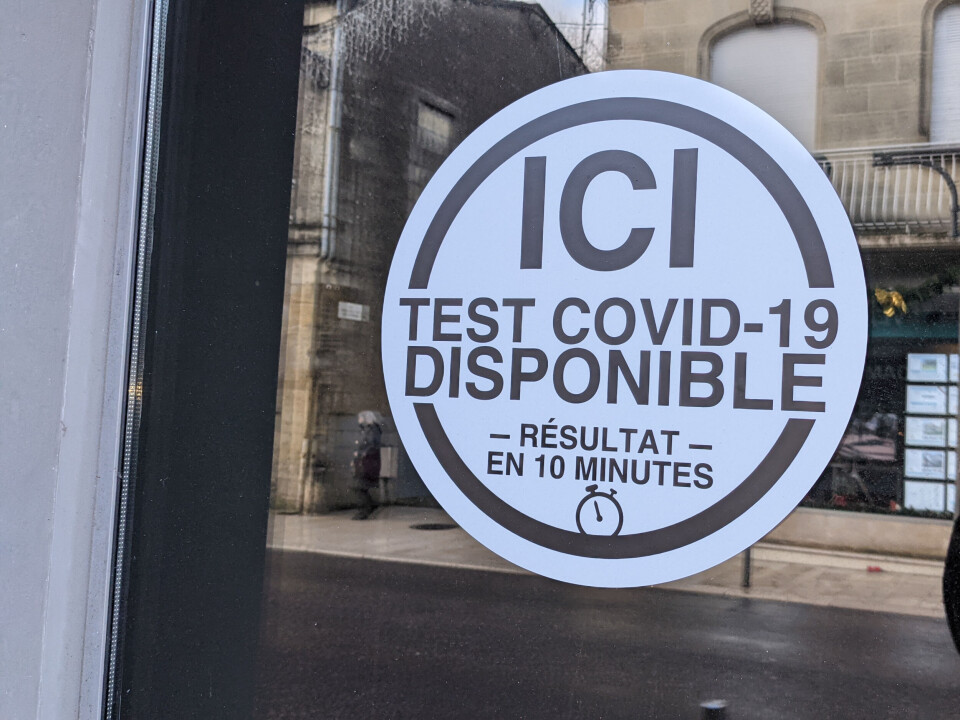-
The curious case of Good Friday: Why only some parts of France get the day off
Three French departments benefit from two extra public holidays
-
How long does it take to sell property in different areas of France? New study
Many major cities are showing signs of recovery when it comes to supply, demand, prices, and time to sell
-
Map: Car insurance costs rise in France - see the average in your region
Multiple studies show that costs are rising by around 5% year-on-year, with major differences by region and vehicle model
Covid test numbers drop in France, questions over their usefulness now
Tests have now dropped beneath the symbolic threshold of 10 million per week, after reaching a peak on January 10, as experts ask whether such extensive testing is still helpful

The level of Covid testing is dropping in France with fewer than 10 million tests now being done per week, after continuous decreasing levels over the past two weeks, new Health Ministry figures show.
Tests have now dropped under the symbolic 10 million threshold, after 9.3 million PCR and antigen tests were done for the week of January 24-30, compared to almost 10.7 million taken the week before, show figures released today (January 3) by statistics authority Drees.
It comes after nine weeks of consecutive rises, driven in part by the Toussaint holidays, the start of the fifth wave, and the Omicron variant.
Daily tests even reached a peak of 2.28 million on January 10, but the number of tests has now been dropping “for two weeks, especially among people aged under 66”, the update said.
The number of new cases also appears to be stabilising, with the seven-day average at 306,076 per day for the past week, compared to 365,130 a week ago.
Infections in Paris have been dropping since the beginning of January, and figures now suggest that cases in the rest of the country have also peaked, especially in the southeast.
However, it remains to be seen how or if the new Omicron sub-variant, called BA.2 – which is even more contagious and already dominant in countries such as Denmark – will affect the situation in the coming weeks.
Is widespread testing still necessary?
As more Covid restrictions are lifted, some epidemiologists have suggested that extensive testing is no longer needed, citing high costs and a lack of reliability.
Some told FranceInfo that due to high vaccination levels among the population*, tests should now be reserved for vulnerable and high-risk people only. Some suggest that letting the virus circulate among vaccinated people will help reach herd immunity, without high risks.
(*The latest figures show that 80.1% of people in France have received at least one vaccine, and 78.2% are fully vaccinated.)
The cost of tests is also a factor; l’Assurance maladie figures show that testing cost €1.6billion for the month of January alone - a figure that the government had previously estimated for the entire year of 2022.
Health Minister Olivier Véran has pledged to lower the cost of tests and encourage people to use cheaper, at-home tests, but doubts remain over their reliability.
In contrast, some experts say that continued testing will help health experts and epidemiologists keep precise track of the state of the epidemic, and enable a deeper understanding of the spread of new variants.
Testing enables the isolation of anyone infected with the now-dominant Omicron variant, and forms part of a strategy to break the chain of infection, proponents argue.
In a suggested 'third way” option, some experts suggest that the country should “test less, but better”, including testing only a representative sample of the population, as is currently done for flu.
They suggest that as the number of cases no longer tallies with the number of hospitalisations, widescale testing does not offer a real insight into the state of the epidemic. In contrast, they say that the best indicator is the number of people in hospital (and therefore the pressure levels on care units).
Similarly, continued widescale testing has caused issues for pharmacies, as they struggle to keep up with demand, even as doubts are cast on the reliability of antigen and at-home tests when it comes to detecting Omicron and BA.2.
Related stories
Coronavirus: Daily updates on the situation in France
School rules, free masks, peak cases: Three Covid updates in France
Masks no longer mandatory outside in France: where must they be worn?
























